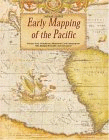Early Mapping of the Pacific: The Epic Story of Seafarers, Adventurers, and Cartographers Who Mapped the Earth's Greatest Ocean

by Thomas Suarez
ISBN: 0794600921
Post Your Opinion | | A Review of: Early Mapping Of The Pacific: The Epic Story Of Seafarers, Adventurers, and Cartographers Who Mapped The EarthÆs Greatest Ocean
by Greg GatenbyThe worst part of this book is the title, for it is dry, almost
academically anemic. However the text inside is a terrific example
of historical writing. The prose is fully accessible and jargon-free,
yet plangent with research. The author manages that neat trick so
rare among historians: he conveys an authority based upon years,
if not decades, of study, while imparting a wealth of facts and
stories in an engaging, comprehensible manner. Where water and
coastline are concerned, the Pacific Ocean should mean almost as
much to Canadians as the Atlantic, but it is the latter which
dominates our textbooks and historical tomes. Suarez reminds us of
the importance of the western ocean to our history, and wryly informs
us, as Canadians and as residents of the western hemisphere, of how
long it took European cartographers to grasp the magnificent breadth
of the ocean-or learn even its shape and perimeter. He is especially
good at explaining why it took the Europeans so long to stumble
onto the northern coast, and then the continental mass of Australia,
despite having knowledge of the tiniest atoll leagues from anywhere.
Yet another strength of this title is the author's study of Asian
sources, and the fanciful, occasionally astute conjectures of the
Japanese and Chinese cartographers form a nice counterpoint to those
of their Continental European counterparts.
The book would be worth buying for the cogency of the writing alone,
but it is the abundance of colour maps and the savvy of their display
which takes the breath away. A few of the maps are of interest only
to the specialist (although even these are pretty to look at). But
the rest are fascinating, either for what they show (usually islands
created out of nothing by cartographers in Spain, Holland or England),
or for what they fail to (surprisingly little was known even into
the late Victorian age). Suarez assumes an interested but ignorant
reader: he guides unpatronizingly through the history of exploration
one studied in school but has mostly forgotten. Would that our own
history teachers had been as witty or as well-informed.
|